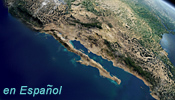![[Ocean Oasis Field Guide]](images/bnr-oo-field.gif)

![[Ocean Oasis Field Guide]](images/bnr-oo-field.gif) |  |
|
Stenocereus gummosus CACTACEAE (Cactus Family) | |
|
The generic name refers to the Greek stenos meaning straight or narrow cactus. The specific epithet refers to the Latin for gummy. DescriptionThis cactus is erect to sprawling 1-3 m (3-9 feet) tall with cylindrical dark green stems 10 cm (4 inches) in diameter with 8-9 longitudinal ribs. The gray to reddish-gray spines are radially oriented, stout and flattened to 4 cm (1-1/2 inches) long. The large fragrant white flowers bloom from July to September, are up to 8 cm (3-1/4 inches) across, and are open for just a single night. The ovoid 6-8 cm (3 inch) wide fruit has bright red interior flesh. Range and HabitatPitaya Agria grows from Ensenada south to the Cape Region. It is a near Baja California endemic but also occurs on most of the Gulf islands and Punta Sargento in Sonora.
Early Spanish explorers and sailors ate the fruit to prevent scurvy. The fruit of Pitaya Agria is even sweeter than the fruit of Pitaya Dulce (Stenocereus thurberi). Branches of this cactus were crushed and thrown into the water to stun fish thereby increasing the catch. The large white flowers are pollinated by hawk moths whose proboscis can navigate the very long flower tubes. Other members of this genus in Baja California are S. thurberi (Organ Pipe Cactus, Pitaya Dulce), and Stenocereus eruca (Creeping Devil, Chirinola)
|


|
Text by Bob Lauri
Top photograph by Jon Rebman, bottom by Reid Moran
Field Guide |
Site Index |
Ocean Oasis Introduction
|
|
© 2000 San Diego Natural History Museum |